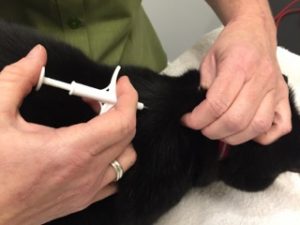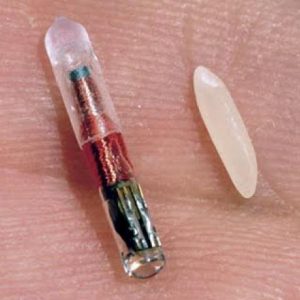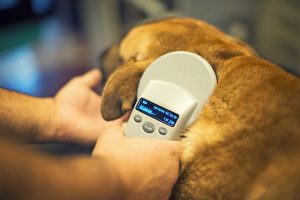 I’ve been talking to someone about the microchip in her cat. It came up that she’s never registered the chip. I explained that if she doesn’t register it, then if her cat ever gets out and makes its way to a veterinarian or shelter that scans and finds the chip, just having the chip in there will not help them get her beloved cat back to her. Each pet microchip contains a unique registration number that needs to be listed in the pet microchip distributor’s registry. But the pet owner is the one responsible for registering their pet.
I’ve been talking to someone about the microchip in her cat. It came up that she’s never registered the chip. I explained that if she doesn’t register it, then if her cat ever gets out and makes its way to a veterinarian or shelter that scans and finds the chip, just having the chip in there will not help them get her beloved cat back to her. Each pet microchip contains a unique registration number that needs to be listed in the pet microchip distributor’s registry. But the pet owner is the one responsible for registering their pet.
Top 5 reasons to microchip your pet
- Microchipping is the only permanent method of pet identification
- Microchipping lasts for the lifetime of your pet (around 25 years)
- Microchipping is a quick and almost painless procedure, like a vaccination
- Microchipping is the best chance of your pet returning to you if stolen
- Microchipping is recommended by the AAHA, ASPCA, AVMA, SAWA, and the Humane Society
What is a microchip?

A pet microchip is a tiny transponder a little bigger than a grain of rice that, when triggered by a scanner, uses radio waves to transmit a unique ID number associated with your pet.
The chip is implanted with a needle just under the skin, between the shoulder blades.
How does a microchip work?
 The microchip does not contain a battery, nor does it produce any on-going signal radiation. It is passive. The microchip is activated only when it comes in close proximity to an active handheld scanner used by a trained, animal professional. Sort of like a radar blip. The handheld scanner triggers and reads the reflected radio signal of the chip and displays your pet’s unique ID number on the scanner screen. The ID number is given to the proper database and they contact the pet owner with the contact info of whoever has your pet so you can be reunited. Some databases allow registered users to stipulate that they want their contact info to be available publicly instead of having the database manager acting as go-between.
The microchip does not contain a battery, nor does it produce any on-going signal radiation. It is passive. The microchip is activated only when it comes in close proximity to an active handheld scanner used by a trained, animal professional. Sort of like a radar blip. The handheld scanner triggers and reads the reflected radio signal of the chip and displays your pet’s unique ID number on the scanner screen. The ID number is given to the proper database and they contact the pet owner with the contact info of whoever has your pet so you can be reunited. Some databases allow registered users to stipulate that they want their contact info to be available publicly instead of having the database manager acting as go-between.
Is a microchip all you need?
An Animal Control officer or a veterinarian will have the special scanner needed to check for and read a chip, but your neighbor down the street or the good Samaritan across town who finds your lost pet will not. But they can read a tag on a collar. Microchips are a great back-up option for pet identification, but should not be the only solution. If Fluffy wanders off, it’s likely to be a private citizen who encounters her first. That’s why identification tags are your pets first ticket home. The chip is insurance should the tag be lost along the way. If your pet is stolen, the registered chip will prove your ownership, and may even result in identifying the animal as stolen.
Is a microchip a GPS tracking device?
You cannot track a lost pet’s location from the microchip. The chip transmits no signal. It is only when your lost pet is found, scanned, and searched for in an online registry that someone will be able to contact you. This is why it is critical to keep your contact information current in an online microchip registry.
Microchip databases

Once your pet’s microchip is registered, your contact information will be accessible at the registry you used for as long as you own your pet – except for 24petwatch which has a 12 months free-then pay a fee policy. If you do not register your chip anywhere, no database will contain your contact info. The chip number may lead a diligent investigator back to whoever installed the microchip for you, but that’s it. So register those chips! Also remember to update your registry file if you change address and/or phone number. Obsolete info is also a dead end for anyone trying to get your pet back to you.
There is no universal national database of pet microchip numbers: each microchip distributor maintains a database of their chips that are in use. However, Jon Dyer of 911PetChipTM tells me there is a universal meta-search tool sponsored by the AAHA (American Animal Hospital Association) that queries all participating distributor databases for you:
This free search engine tells you which microchip company database a chip is registered in, when it was last updated, and the toll free number to call and their web site address (if they have one). This is the tool that is used universally by animal control and veterinarians to search for microchips to see if they are registered and if so, where.
I tested this tool using the microchip numbers for my dogs (who were adopted from different sources who used different brands of chips) and got accurate results on both.
In addition there are third party registries that maintain their own databases. Most third-party registrars charge a fee (typically $19.95) to register a chip. Most offer additional services that may or may not be of use to you. These may include A veterinarian helpline, storage of pet medical and behavioral information, and coupons and discounts on pet supplies and services. Be careful though, not all 3rd party registrars are participants in the AAHA search engine. Stick to the registries listed at the end of this article.
If your chip brand charges a high fee to register (most do not) or you want to be doubly sure your pet’s infi is available and don’t need the frills of the paid third-party registries, you may register the chip for free here:
https://www.freepetchipregistry.com/
These folks claim to be “the only truly free registry in the country”. I’ve checked their User Agreement and their web site and I did not find any reason to suspect a scam.
Participating Microchipping and Pet Recovery Services
| Currently, these companies are incorporated into the AAHA search tool:
This list is accurate as of the article publication date. If you find this article after time has passed, go here for a current list: http://www.petmicrochiplookup.org/participating_companies.aspx |
Distributors/Brands of pet microchips: .
|



